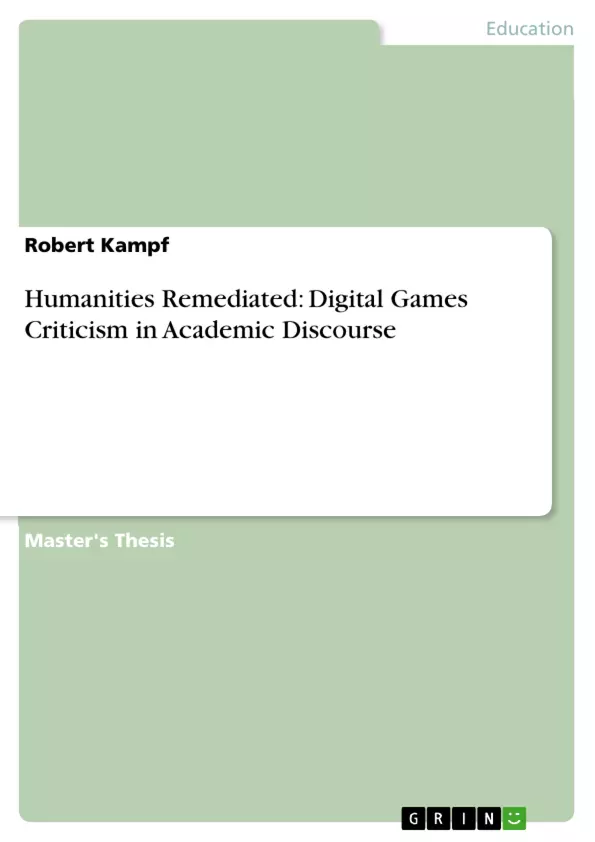Digital games are products of contemporary popular culture and indicators of social and cultural processes in modern computerized information societies. In recent years digital games asserted their status not only as a popular form of entertainment but also as virtual spaces for social interaction, escapism from reality, electronic sports and digital art. The first scientific studies of digital games date back to the late 1970s but recent debates about violence and addiction revived the interest in game research. The field of academic game studies describes the social, cultural, political, ideological, philosophical and psychological dimensions of digital games and their effects and influence on players.
This paper presents an outline of game studies as academic school of thought and their role in scientific, public and political debates. The ambition of this paper is to demonstrate that game studies are a resourceful field of work and can be beneficial to the humanities. More importantly this work states that it is necessary to form an institutionalized frame of academic game research in order to retain the ability to describe and analyze a growing cultural and social phenomenon of unprecedented proportions. Without game studies, whole sectors of youth culture and virtual social networks will barely be accessible to academic research. Above that, the ability of digital games to imitate, explain and even influence real-world social systems is only a small part of the potential that will remain unexplored.
Inhaltsverzeichnis (Table of Contents)
- Part 1: Digital Games in Academic Discourse
- Abstract
- I. Digital Games: The State of Play
- II. Digital Games Criticism: Theories and Contexts
- A. Game Studies
- B. Digital Game Theory
- III. The Concepts of Play and Game
- IV. Digital Games in the Reality of Culture and Society
- Part 2: Digital Games Research and Criticism
- Research and Criticism of Violence in Digital Games
- A. Cultural Differences in the Meaning of Violence
- B. Summary and Criticism of Current Violence and Risk Research
- B1. Active Media vs. Active User Perspective
- B2. Studies on Effects and Representations of Violence in Digital Games
- VI. Digital Games and Gender Studies
- A. Female Characters - Female Players: The Role of Women in Digital Games
- B. Summary and Criticism of Current Gender Game Studies
- C. Gender Representation in Digital Games: Tendencies and Perspectives
- VII. Game Studies in the Humanities
Zielsetzung und Themenschwerpunkte (Objectives and Key Themes)
This paper explores the field of academic game studies, examining its development and significance within contemporary society. It aims to demonstrate the importance of integrating game studies into the humanities, arguing that it is a valuable resource for understanding and analyzing a growing cultural phenomenon. The paper investigates the historical and cultural context of digital games, including their role in modern entertainment and social interactions. It also examines the theoretical frameworks and debates surrounding game studies, focusing on the concepts of play, violence, and gender representation. Key themes explored include:- The development and evolution of digital games as a cultural force.
- The role of digital games in shaping social, cultural, and political landscapes.
- The critical analysis of violence and gender representations within digital games.
- The potential and limitations of game studies as a research field.
- The need for institutionalized and interdisciplinary game research within the humanities.
Zusammenfassung der Kapitel (Chapter Summaries)
Part 1: Digital Games in Academic Discourse
The first part of the paper establishes a foundational understanding of digital games within academic discourse. It begins by situating digital games within the context of modern entertainment media, highlighting their significant role in contemporary popular culture. Chapter Two introduces the fundamentals of digital game criticism, outlining key theoretical frameworks and influential authors. This chapter also explores the internal debates and challenges within game studies as an aspiring academic discipline.
Chapter Three examines the concepts of "play" and "game," providing insights into the core mechanics of gameplay, specifically narrative and action. The final chapter of Part 1 analyzes the cultural and social implications of digital games, discussing their impact on real-world perceptions and the interpretations of virtual environments.
Schlüsselwörter (Keywords)
Digital games, game studies, popular culture, violence, gender, social interaction, cultural analysis, academic discourse, research, humanities, digital art, virtual environments.Frequently Asked Questions
What are "Game Studies"?
Game Studies is an academic field that analyzes the social, cultural, political, and psychological dimensions of digital games and their effects on players.
Why are digital games important for the humanities?
They are products of popular culture and indicators of social processes, serving as virtual spaces for interaction, art, and even electronic sports.
How is violence in digital games addressed in this paper?
The paper summarizes current violence research, distinguishing between the "active media" and "active user" perspectives and looking at cultural differences in the meaning of violence.
What is the role of gender in game studies?
The analysis examines the representation of female characters, the role of female players, and current tendencies in gender-related game research.
What are the core concepts of gameplay discussed?
The study focuses on the concepts of "play" and "game," exploring core mechanics such as narrative and action.
- Quote paper
- M.A. Robert Kampf (Author), 2010, Humanities Remediated: Digital Games Criticism in Academic Discourse, Munich, GRIN Verlag, https://www.grin.com/document/271790



